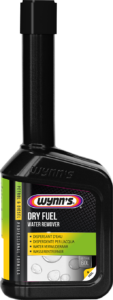What is a fuel stabiliser?
A fuel stabiliser is an additive that prevents petrol from spoiling. Fuel stabilisers are not developed for everyday use but are intended to be added to engines that are not used for long periods or used infrequently, such as tools and other equipment.
Fuel stabilisers help to prevent fuel from spoiling and ensure its usefulness for more extended periods when fuel is stored or not changed frequently.
The additive binds to the fuel to reduce evaporation caused by high temperatures and humidity. In fact, a mixture of antioxidants and lubricants helps to slow fuel decomposition and resist the impact of oxygen.
A treatment creates stability in the fuel and makes it resistant to environmental elements such as humidity and oxygen.
Good quality fuel stabilisers such as Dry Fuel contain high-performance corrosion inhibitors, metal deactivators and antioxidants to prevent rust and oxidation. They also prevent the formation of gums, lacquers and varnishes and ensure easy starting after prolonged storage.
The long-term effects of fuel stabilisers benefit the engine or equipment. Running the engine with stagnant fuel can cause considerable damage and corrosion, leading to parts replacement and increased costs of both maintenance and repairs over the engine’s life.
Is a fuel stabiliser necessary?
The longer fuel is stored, the more it breaks down. Natural degradation typically begins within six weeks of purchase and once the process has started, it will continue to degrade.
Biofuels are more likely to decompose and degrade than ordinary fuels because they are composed of hygroscopic elements. This means that they absorb water; the more they absorb, the more they accumulate until they reach a saturation point. When this point is reached, the fuel can no longer accept the water level and the components begin to separate. This process is known as phase separation. Phase separation leads to malfunctions and poor engine performance, which can result in component failure as the water corrodes internal components.
Water can also cause fuel injectors to fail. Injectors operate at high pressures and temperatures, and the water in the tip of the injector boils, causing the tip to swell and expand. If the injectors fail because the tip has swollen, removing it from the engine can be challenging.
Signs of fuel contamination include loss of engine performance and response, and in some cases, misfiring.
In addition, as fuel degrades, it generates lacquers, varnishes and gums on fuel system components. This can form a sticky coating and affect the engine’s fuel supply, particularly the injectors’ internal parts. Poor spray distribution from the injectors leads to performance and handling problems, starting efficiency and can also lead to further contamination of other components. If the fuel is not atomised at delivery time, vaporisation in the engine is ineffective. In turn, the combustion of fuel and air is affected and the engine loses power. During this phase, known as incomplete combustion, exhaust emissions increase and the process generates soot. This can lead to problems with exhaust gas recirculation systems, intake systems and blockages of particulate filters.
In the wet part of the fuel system, the sulphate salts present in certain fuels with a high ethanol content cause corrosion of internal components and the driver is unaware that these salts are causing damage. Sulphate salts cause corrosion of most metals used in the fuel system.
When should I use a fuel stabiliser?
Fuel stabilisers are recommended for equipment or vehicles that are used infrequently, or where fuel is stored for periods longer than 1 or 2 months.
Adding a stabiliser reduces breakdowns and keeps the fuel in good condition.


Leave A Comment